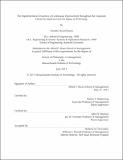The implementation dynamics of continuous improvement throughout the corporate hierarchy based on lean six sigma at DTE energy by Timothy David Quinn.
Author(s)
Quinn, Timothy David
DownloadFull printable version (4.966Mb)
Other Contributors
Sloan School of Management.
Advisor
Nelson P. Repenning and John D. Sterman.
Terms of use
Metadata
Show full item recordAbstract
This dissertation comprises a case study and formal simulation model of DTE Energy's Lean Six Sigma continuous-improvement (CI) program from its inception in 1998 through the end of 2009. The case history is based on qualitative fieldwork involving interviews, direct observation, and collection of company documents and records. DTE Energy is one of the top 20 largest electricity and natural gas utilities in the U.S. It adopted CI from its automotive industrial customers in southeast Michigan. During the 12-year period I studied, DTE Energy's CI initiative was stressed by three organizational crises. Typical of other companies' CI initiatives, DTE Energy's success with CI was variable, prompting experiments and revisions to its CI training and methods, to its tactics for garnering managers' attention and support, and to its methods for orchestrating improvement work. Several leaders of the CI initiative were graduates of MIT's Leaders for Manufacturing program and were heavily influenced by research on the Toyota Production System (TPS) by Steven Spear (e.g., Spear and Bowen 1999) and Jeffrey Liker (e.g., Liker 2004). About halfway through this history, DTE Energy added Six Sigma tools and practices to its CI initiative, creating a Lean Six Sigma program. I formulated a System Dynamics (SD) simulation model based on this case study. In this dissertation, I elaborate and extend previous work in the SD literature on the implementation dynamics of CI initiatives, especially Sterman and colleagues' (1997) model of the Total Quality Management (TQM) program at Analog Devices. My model represents explicitly the corporate hierarchy, which I divided into three levels: senior executives, middle managers, and front-line employees. I also examined the interactions between front-line employees engaging in their own Lean-style CI activities and Six Sigma Black Belts doing CI projects. Based on my simulation analysis, I find that managers' and Black Belts' support and coaching required by front-line employees is usually chronically inadequate. I also find that Black Belts or industrial engineers, as full-time experts for process redesign and improvement, are crucial to the growth and long-term sustainability of a company's CI initiative.
Description
Thesis (Ph. D.)--Massachusetts Institute of Technology, Sloan School of Management, 2011. This electronic version was submitted by the student author. The certified thesis is available in the Institute Archives and Special Collections. Cataloged from student submitted PDF version of thesis. Includes bibliographical references (p. 409-412).
Date issued
2011Department
Sloan School of ManagementPublisher
Massachusetts Institute of Technology
Keywords
Sloan School of Management.